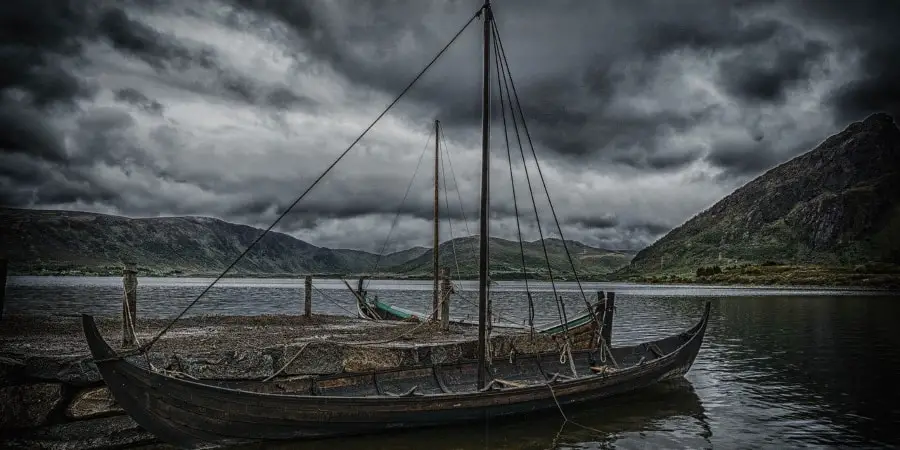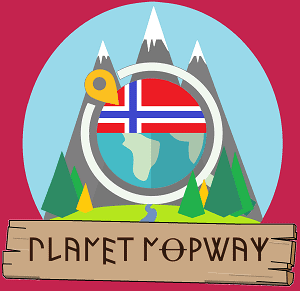The Vikings became famous because of their shipbuilding abilities which enabled them to explore, trade and raid throughout Europe, as well as explore unknown worlds.
Because of this, the sea was of great importance to the Vikings. Consequently, the Vikings would also worship Njord, which is considered the Norse god of the sea.
In this article, we will take a look at who Njord was, what is written about him in Norse mythology, and his importance For the Viking’s Norse paganism.

Who was Njord?
Njord was a god of the Vanir, a separate group of gods associated with health, fertility, wisdom, and the ability to see the future.
They were separate from the Æsir, whose gods were associated with power and war, and included the likes of Odin and Thor.
The two groups of gods engaged in conflict in the Æsir-Vanir war, which resulted in a truce and subsequent unification.
As a part of this truce, Vanir and Æsir gods were exchanged as hostages to live with one another to prevent future wars.
Njord was one of the Vanir gods, sent from the home of the Vanir, Vanaheimr, to live among the Æsir in Asgard. Here he settled by the sea in a place known as Nóatún, meaning a place where ships lie.
He quickly gained Odin’s trust and was recognized as a god of the Æsir and the god of the wind and waters, and the patron of sailors and fishermen.
It was also said that Njord could bring wealth to the just and deserving. As a consequence, Njord was often called upon by the Vikings before setting out on sea voyages.
Family
Little is known about Njord’s origin as it is not elaborated on in any of the surviving sagas. Scholars have theorized that he might be connected to the earlier attested gods in Germanic paganism, more specifically the goddess Nerthus.
What we do know from the sagas it is that incest was common among the Vanir gods, and it is written that Njord had two children with an unnamed sister, The god Freyr and the goddess Freyja.
Both Freyr and Freyja accompanied their father to Asgard as a part of the truce between the Vanir and Æsir where they became recognized as important gods themselves.
Mythology (in the sagas)
Most of Njord’s surviving mythology is detailed in both the Prose and Poetic Edda and Heimskringla. Most of it details his ill-fated marriage to Skadi of the jötnar, a group of entities contrasted with the gods and other non-human beings such as elves and dwarfs.
Njord’s marriage to Skadi
It was told that Skadi’s father, the giant Thjazi, conspired with Loki to kidnap the goddess Idunn. Upon learning this, The gods threaten Loki into bringing her back, which he does by taking the shape of an eagle.
As Loki flies back to Asgard with Idunn, he is chased by Thjazi who has also taken the shape of an eagle. Realizing Thjazi is going to catch them before reaching Asgard, the gods light a fire that burns Thjazis feathers, causing him to fall to his death.
Upon learning this, Skadi is furious and travels to Asgard to seek vengeance. When she arrives the gods offer her compensation for her loss, including a husband of choice among the gods.
However, she can only choose her husband by looking at his feet. Skadi picks the feet she considered to be the most beautiful, hoping that they belong to Baldur, the most handsome and gracious of all the gods, only to find out they belong to Njord.
Their marriage was not a success. Skadi felt at home in her mountainous homeland of Thrymheimr, while Njord felt at home in Noatun by the sea.
The two made an agreement that they would spend nine nights in Thrymheimr and then the next three nights in Nóatún but to no avail. It is said that Njord complained when he returned from the mountains;
Hateful for me are the mountains, I was not long there, Only nine nights.
The howling of the wolves sounded ugly to me after the song of the swans.
To which Skadi replied;
Sleep I could not in the sea beds for the screeching of the birds.
That gull wakes me when from the wide sea he comes each morning.
Ultimately their marriage ended without producing any children and it is said that Skadi went on to marry Odin and have many sons.
Njord and Ragnarok
In the poetic Edda, Njord is described as a future survivor of Ragnarok, the foretold series of events leading to the end of the known world.
It is said that Ragnorok will include a great battle where many gods will lose their lives, as well as several natural disasters. However, Njord will survive, after which he will return to Vanarheim.
How important was Njord?
The Vikings were dependent on the sea, and most of their exploits were possible due to their skills in shipbuilding and their ability to navigate the seas.
Because of this, Njord became a popular and important god who was often called upon by Norse seafarers due to his said abilities to calm waters and provide a bounty to those worthy.
Njord was described as being extremely wealthy and prosperous, as a consequence, it was said that he was able to grant wealth in the form of bounty as well as land to those who invoke his aid.
To highlight this popularity, it is said that worship and veneration of Njord survived in parts of Norway into tho the 18 and 19th century where they would thank him for bountiful fishing.
In popular culture
Unlike many other Norse gods, Njord has not received as much attention in popular culture.
That being said, the name Njord is a common male first name in Norway, often being written Njård. Also, one of the Oil fields in the North sea bears his name.
Njord was one of the resurrected gods in the New Zealand Comedy/drama television series “The Almighty Johnsons”.
